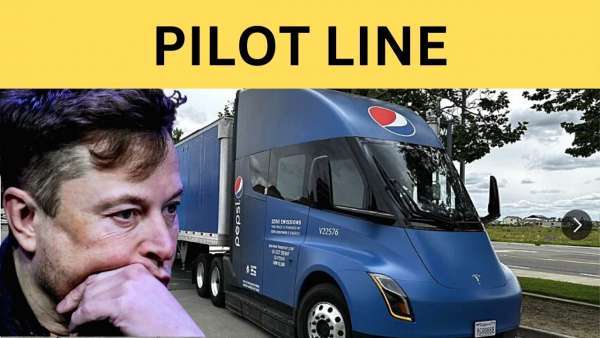
The latest Tesla Semi recall hints that the Semi production pilot line may still be operating well under even its pilot capacity.
UPDATE: Torque News today confirmed that Tesla is operating a production line at Giga Nevada and it's gaining a new momentum.
Tesla has recently issued a voluntary recall for its Tesla Semi trucks, which provides us with some insight into the current state of its pilot production line. The recall involves a software update to ensure that the side door warning system functions correctly. While the recall itself is not a significant issue, it sheds light on the pace of Tesla Semi production.
During the last quarter, Tesla referred to its production line as the "pilot production" line for the Semi, capable of manufacturing five trucks per week. However, the company did not disclose specific production numbers for the Semi in its Q1 report. Based on the details provided in the recent recall update, it appears that the pilot line may still be operating below its intended capacity.
This is not the first time Tesla has initiated a recall for the Tesla Semi. In March, the company issued a recall due to a faulty parking brake module supplied by Intellipark systems. It is important to note that other truck models utilizing the same brake module were also affected, indicating that it was not an exclusive Tesla issue.
The previous recall encompassed vehicles produced between November 30 and February 28, totaling 35 vehicles. This aligns with the reported deployment of 36 Semi trucks to Tesla's first customer, PepsiCo and its subsidiary Frito-Lay.
The most recent recall includes 36 vehicles, one less than the previous recall, but matches the reported number of deployments. According to the recall paperwork, the affected trucks were manufactured between November 30 and March 15, covering an additional 15 days of production and one more truck within that timeframe.
The recall notice reveals that Tesla identified the software violation of FMVSS rules on June 1 and promptly developed a fix, which began deployment on June 6.
However, this raises questions about the trucks produced after March 15. Were these vehicles already equipped with an updated software version, while the older trucks are awaiting the update? Alternatively, has Tesla halted production since March 15, resulting in no further trucks being subject to the recall?
In any case, it is evident that Tesla Semi production is progressing slowly, if at all.
Recently, Tesla provided an update on Semi production, stating that volume production is not expected to commence until the end of next year. The company cited battery supply limitations as a contributing factor, which has been mentioned in previous reports.
Considering that Tesla aimed to manufacture 50,000 trucks per year by 2024, as disclosed in late 2022, the recent production update suggests that achieving this target is highly unlikely. It appears that the initial batch of 25 trucks produced for PepsiCo and Frito-Lay may have served as a test run and a means to avoid a public cancellation of a major order.
Furthermore, the lack of information regarding the Semi's price, range, and weight raises concerns. It is plausible that this initial batch was not ready for full-scale production and may require modifications based on feedback from real-world drivers.
To date, only a few instances of Tesla Semi breakdowns have been publicly observed, and the 50,000 run rate for the Tesla Semi by the end of 2024 seems contingent on the construction of a new factory. At present, Tesla's production line for the Semi remains low-volume until the new facility is established.
So what do I make of this: the recent recall of Tesla Semi trucks indicates that the pilot production line may be operating below capacity, Electrek thinks.. With ongoing challenges in battery supply and limited information about the truck's specifications, it remains uncertain when volume production will commence. Tesla's ambitious goal of manufacturing 50,000 trucks per year by 2024 appears increasingly improbable, considering the current production update.
Armen Hareyan is the founder and the Editor in Chief of Torque News. He founded TorqueNews.com in 2010, which since then has been publishing expert news and analysis about the automotive industry. He can be reached at Torque News Twitter, Facebok, Linkedin and Youtube.
